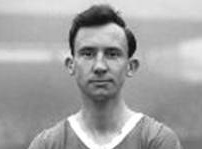|
|
|
Warren
Bradley |
Manchester United
FC
3 appearances, 2 goals (one on
debut)
P 3 W 1 D 1 L 1 F 11:
A 5
*(actual F 10: A 4)
50% successful
1959
captain: none
minutes played: 202 |
 |
|
Timeline |
|
|
Warren Bradley |
(*Actual
for and against are the goals scored
while the player was on the field.) |
|
Birth |
20 June 1933 in
Hyde, Cheshire
[registered in
Stockport, June 1933].
Attended Hyde Grammar School and Durham University. |
|
Marriage |
to Margaret Steward [registered in
Durham Northern, September 1958]. Three daughters, Tracy, Sally
and Caroline |
|
Death |
9 June 2007 in
Manchester,
aged
73 years 354 days |
|
Source |
Douglas Lammings' An
English Football Internationalist Who's Who [1990] &
 |
|
Club Career |
|
Club(s) |
Started his football career as an amateur at
Durham City FC, also appearing as an youth at Bolton Wanderers FC, before
signing with Bishop Auckland FC in 1955, a leading amateur side. He was
one of the players drafted into Old Trafford dressing room following the
Munich tragedy of February 1958. He signed as an amateur, playing for the
United reserves, turning part-time professional in the November of that
year. After 63 league appearances and two goals, he was
sold to Bury FC in March 1962 for a £6000 transfer fee,
where he made another thirteen league appearances, scoring a solitary
goal. He joined Northwich Victoria FC in July 1963 and then
Macclesfield Town FC in November 1963. Joined Bangor City FC from 1964
until 1965, returning to Macclesfield in April 1966. |
|
Club honours |
FA Amateur Cup winner 1955-56, 1956-57; |
|
Individual honours |
None |
|
Distinctions |
None |
|
Height/Weight |
5'
4", 9st.
10lbs [1959]. |
|
Source |
Douglas Lammings' An English
Football Internationalist Who's Who [1990]. |
|
England Career |
|
Player number |
777th
player to appear for England. |
|
Position(s) |
Outside-right |
|
First match |
No. 330,
6 May 1959, England 2 Italy 2, a
friendly match at Empire Stadium, Wembley, London, aged 25 years
320 days.
 |
|
Last match |
No. 334,
28 May 1959, United States 1 England 8, a tour
match at Wrigley
Field, Los Angeles, California, aged 25 years 342 days.
 |
|
Major tournaments |
None |
|
Team honours |
None |
|
Individual honours |
England
Amateur (eleven appearances) |
|
Distinctions |
Bradley
is the only player to win amateur and professional England appearances in the
same season, 1958-59. |
|
Beyond England |
A schoolmaster by profession. -
An English Football Internationalists' Who's Who.
Douglas Lamming (1990). Hatton Press, p.42/43.
He earned his teaching degree in Geography at Durham
University, and this was followed with National Service as an officer in the RAF
(based at Middleton St. George, Darlington) and a first teaching job
at the Great Stone secondary modern school at Stretford, Busby having persuaded
him to take a job in Manchester while commencing his Old Trafford sojourn. Then
came a few years of living a double life, teaching by day, training for United
on two evenings a week, all the while playing top-level matches. Eventually the
conflicting demands of work and football dictated a full-time move into
education, and he relished it. In 1968 Bradley became a head teacher, presiding over the conversion of a
large secondary modern into a comprehensive school. In his next job he oversaw
the change from single-sex to co-ed, and then he was responsible for the
successful amalgamation of three schools in Bolton - one grammar and two
secondary moderns - into a 2,000-pupil comprehensive. He trained as a school inspector in 1988 and set up his own educational
management consultancy, contracting work from the newly formed Ofsted until
retirement in his sixties. - Independent obituary. |
|
The Numbers |
|
parties |
Apps |
starts |
substitute |
unused/
reserve |
minutes |
 |
goals ave.min |
 |
captain |
| 5 |
3 |
2 |
▲1
▼0 |
two |
202 |
2 |
101
min |
two |
none |
|
minutes are an approximation, due to the fact that many matches rarely stick to exactly ninety minutes long, allowing time for injuries and errors. |
|
P |
W |
D |
L |
F |
A |
GD |
FTS
|
CS |
FAv |
AAv |
Pts% |
W/L |
|
3 |
1 |
1 |
1 |
11 |
5 |
+7 |
0 |
0 |
3.667 |
1.667 |
50 |
=0 |
|
All matches were played as a friendly match and in a white shirt |
Venue Record
|
Venue |
P |
W |
D |
L |
F |
A |
GD |
FTS
|
CS |
FAv |
AAv |
Pts% |
W/L |
|
Home |
1 |
0 |
1 |
0 |
2 |
2 |
=0 |
0 |
0 |
2.00 |
2.00 |
50.0 |
=0 |
|
Away |
2 |
1 |
0 |
1 |
9 |
3 |
+6 |
0 |
0 |
4.50 |
1.50 |
50.0 |
=0 |
Match History
|
Club: Manchester
United F.C. - three full appearances (213 min) 2ᵍ |
manager:
Walter Winterbottom - three full appearances (213 min) 2ᵍx
|
|
|
|